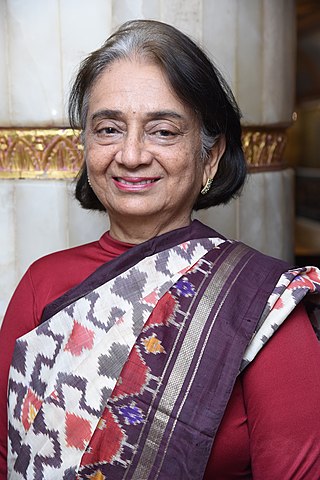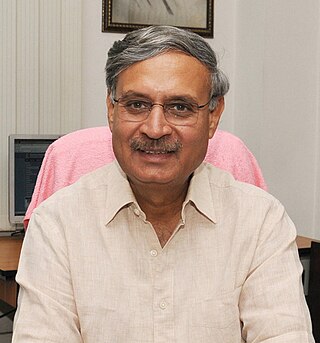The Planning Commission was an institution in the Government of India which formulated India's Five-Year Plans, among other functions.
From 1947 to 2017, the Indian economy was premised on the concept of planning. This was carried through the Five-Year Plans, developed, executed, and monitored by the Planning Commission (1951–2014) and the NITI Aayog (2015–2017).

The All India Council for Technical Education (AICTE) is a statutory body, and a national-level council for technical education, under the Department of Higher Education. Established in November 1945 first as an advisory body, which was given statutory status by an Act of Parliament in 1987, the AICTE is responsible for proper planning and coordinated development of the technical education and management education system in India.
Mahatma Gandhi National Rural Employment Guarantee Act 2005 or MGNREGA, earlier known as the National Rural Employment Guarantee Act or NREGA, is an Indian social welfare measure that aims to guarantee the 'right to work'. This act was passed on 23 August 2005 and was implemented in February 2006 under the UPA government of Prime Minister Manmohan Singh following tabling of the bill in parliament by the Minister for Rural Development Raghuvansh Prasad Singh.
National Population Commission is a commission of the Indian government.

Jyoti Kirit Parikh is the current Executive Director of Integrated Research and Action for Development (IRADe). She was a Member of the Prime Minister’s Council on Climate Change –India and is a recipient of Nobel Peace Prize awarded To IPCC authors in 2007. She was a Senior Professor at Indira Gandhi Institute of Development Research (IGIDR), Mumbai. She also worked at the International Institute for Applied Systems Analysis (IIASA), Austria and served as a senior energy consultant at the National Institution for Transforming India (1978–80). She was a visiting professor at the Institute of Advanced Studies (IAS) of UNU, Tokyo (1995–96). She was the Acting Director of IGIDR for 1997-98. She has experience for nearly thirty years on energy and environment problems of the developing countries.
Economic Advisory Council to the Prime Minister of India (PMEAC) is a non-constitutional, non-permanent and independent body constituted to give economic advice to the Government of India, specifically the Prime Minister. The council serves to highlight key economic issues facing the country to the government of India from a neutral viewpoint. It advises the Prime Minister on economic issues like inflation, microfinance, and industrial output.
Bangladesh Planning Commission is the economic public policy institution of the Government of Bangladesh. The Planning Commission undertakes research studies and policy development initiatives for the growth of national economy and the expansion of the public infrastructure of the country, under the Ministry of Planning and alongside the Ministry of Finance.
Direct Benefit Transfer or DBT is an attempt to change the mechanism of transferring subsidies launched by Government of India on 1 January 2013. This scheme or program aims to establish a Giro system to transfer subsidies directly to the people through their linked bank accounts. It is hoped that crediting subsidies into bank accounts will reduce leakages, duplicity and delay and the new processes will increase transparency and accountability.
Centrally Sponsored Schemes (CSS) are schemes that are implemented by state governments of India but are largely funded by the central government with a defined state government share. Examples of such schemes include the Mahatma Gandhi National Rural Employment Guarantee Act and the Pradhan Mantri Gram Sadak Yojana.

The NITI Aayog serves as the apex public policy think tank of the Government of India, and the nodal agency tasked with catalyzing economic development, and fostering cooperative federalism and moving away from bargaining federalism through the involvement of State Governments of India in the economic policy-making process using a bottom-up approach. Its initiatives include "15-year road map", "7-year vision, strategy, and action plan", AMRUT, Digital India, Atal Innovation Mission, Medical Education Reform, agriculture reforms, Indices Measuring States’ Performance in Health, Education and Water Management, Sub-Group of Chief Ministers on Rationalization of Centrally Sponsored Schemes, Sub-Group of Chief Ministers on Swachh Bharat Abhiyan, Sub-Group of Chief Ministers on Skill Development, Task Forces on Agriculture and up of Poverty, and Transforming India Lecture Series.
Santosh Mehrotra is a development economist, whose research and writings have had most influence in the areas of labour, employment, skill development, on the relationship between human development and economic growth, child poverty, and the economics of education. He was an economic adviser in the United Nations system in New York City, Italy, and Thailand (1991–2006), and technocrat in the government of India (2006–2014), apart from making contributions to academic research since the mid-1980s. He has also in recent years established a reputation as an institution-builder in the field of research in India, despite facing difficult odds. He brings a combination of professional experience: with the Indian government as a policy maker and adviser, with international organisations as a technical expert, having lived on three continents and travelled to 63 countries providing technical advice to governments; and as an academic whose research work has been translated into French, Spanish, Portuguese, Italian and German.

First Pinarayi Vijayan ministry is the Council of Ministers headed by Pinarayi Vijayan that was formed after the Left Democratic Front (LDF) won the 2016 Kerala Legislative Assembly elections. The Council assumed office on 25 May 2016. The ministry had a total of 19 ministers in the Cabinet at the time of swearing-in compared to 21 ministers in the previous government. Pinarayi Vijayan sworn in as 22nd Chief Minister of Kerala, 12th person to hold this position. Chief Minister Pinarayi Vijayan on 3 May 2021 submitted the resignation of the Council of Ministers headed by him to Governor Arif Mohammed Khan after winning a historic victory in the 15th legislative assembly elections by winning 99 of the 140 seats in the Assembly.
The minimum support price (MSP) is the minimum price for select crops raised in kharif and rabi seasons that the Government of India considers as remunerative for farmers and hence deserves support. This is different from procurement price and issue price. It is generally announced before the sowing/planting season. It is approved by the government and aims to safeguard the farmer to a minimum profit for the harvest while at the same time increasing food security in the country. MSP was initially an incentive for farmers to adopt technology with an aim of increasing the productivity of agricultural land in the 1960s, however in the 2000s it is seen as a market intervention and farmer income scheme. The effectiveness of such a price policy has varied widely between states and commodities. Awareness among farmers of the existence of an MSP is poor at 23%, while awareness of MSP procurement agencies is also poor with only about 20–25% of wheat and paddy produce being sold at MSP.
The Parliamentary Standing Committee on Finance (SCOF) is a department related standing committee (DRSC) constituted by the Parliament of India comprising selected members of parliament for the purpose of legislative oversight on the policies and decision making of the following four ministries:
- Ministry of Finance (MoF)
- Ministry of Corporate Affairs
- Ministry of Statistics and Programme Implementation
- NITI Aayog

Ministry of Planning is a ministry in India. The minister responsible is the Hon'ble Prime Minister of India. The ministry's institutional capacity is exercised through the central agency: NITI Aayog.
B.V.R Subramaniyam is a retired 1988-batch Chhattisgarh cadre Indian Administrative Service (IAS) officer. He has been Secretary in the Ministry of Commerce & Industry, Chief Secretary-Jammu & Kashmir, Principal Secretary-Government of Chhattisgarh, and has held positions in the Prime Minister’s Office. He has previously served in the Prime Minister’s Office (PMO) under both Manmohan Singh and Narendra Modi. He has been instrumental in containing insurgency in Chhattisgarh in the 2010s. In February 2023, he has taken charge as 4th CEO of NITI Aayog.
National Action Plan for Climate Change (NAPCC) is a Government of India's programme launched in 2008 to mitigate and adapt to the adverse impact of climate change. The action plan is designed and published under the guidance of Prime Minister’s Council on Climate Change (PMCCC). The 8 sub-missions aimed at fulfilling India's developmental objectives with focus on reducing emission intensity of its economy. The plan will rely on the support from the developed countries with the prime focus of keeping its carbon emissions below the developed economies at any point of time. The 8 missions under NAPCC are as follows:
The Aspirational Districts Programme is an initiative by the Government of India implemented by NITI Aayog with the help of various stakeholders to improve the living standards of people in aspirational districts.





